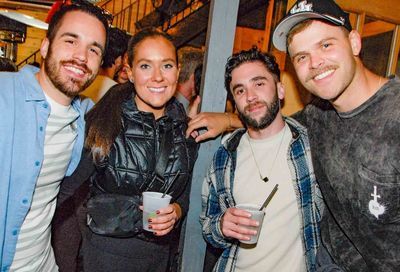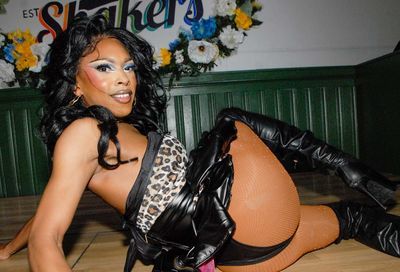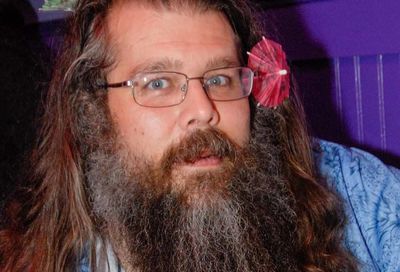The Fetal Position
PLAGAL Marches for Life or with Uneasy Allies
Photos by Michael Wichita
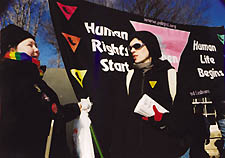 |
What exactly is a gay issue? Global warming? War in Iraq? These are, at least, issues that affect gays and lesbians just by their virtue of affecting all people.
But while same-sex intimacy rarely results in unintended pregnancy, some gay activists have carried the torch for abortion rights on the grounds that the government shouldn’t be telling anyone what to do with their bodies — an obvious concern for sodomy enthusiasts.
The pro-life camp, on the other hand, hardly seems like a probable queer stomping ground. Not only does it endorse the idea that government can hold sway over a person’s bodily choices, but it’s also home to a good-sized chunk of conservative Christian homophobes. This makes gay pro-lifers a slim minority. And, as minorities tend to do, they’ve organized.
“As gays and lesbians, we’re even more sensitive to issues of human rights, and because we’re sensitive to this, we also look at the rights of the unborn, ” explains Cecilia Brown, Cleveland-based president of the Pro-Life Alliance of Gays and Lesbians (PLAGAL).
Last Wednesday, January 22, about half-a-dozen PLAGAL members joined tens of thousands of pro-life advocates near the National Mall for the annual Right to Life March. This year’s marchers were electrified by a Republican-dominated Congress and the thirtieth anniversary of Roe v. Wade, the historic Supreme Court decision that legalized abortion.
PLAGAL’s participation in the march was prefaced with tense anticipation. Last year, PLAGAL’s participants were “wrestled to the ground and dragged away ” by U.S. Park Police, according to Brown.
In that incident, the PLAGAL members were first ordered by the police to take down their banner, which displayed the organization’s name and the phrase, “Human Rights Start When Human Life Begins. ” When the marchers refused, Brown and PLAGAL Vice-President Erik Jurek were charged with demonstrating without a permit, handcuffed, issued tickets and then released on their own recognizance.
According to PLAGAL, the arrest orders came directly from Nellie Gray, President of the March for Life. She had warned the PLAGAL marchers that they would be arrested if they tried to march with their banner, which PLAGAL says she found offensive because it contained the words “gays and lesbians. ”
Jurek paid his ticket, but Brown contested hers. When she returned to Washington for her day in court, however, there was no record of her arrest. The group’s banner had also vanished, along with her mug shot and fingerprints.
“I came all the way from Cleveland for my day in court, ” she said. “We feel that something shady took place. ”
That was one year ago. Last week, PLAGAL joined this year’s Right to Life March without incident, and carried their new banner, slightly modified in style but virtually identical in content.
“We’re here again, ” said Brown at last week’s march, held under a sunny yet frigid sky. “And we’ll continue to be here year after year. If we get arrested, we get arrested. ”
The marchers did not get arrested, but not because of an enlightened Nellie Gray. When contacted by phone for comment, Gray was initially amicable, but abruptly cut the interview short when told that Metro Weekly is a gay publication.
“Did PLAGAL attend the march? ” she asked. When informed that they had, she hung up.
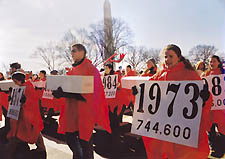 |
Many of the other pro-life marchers didn’t share Gray’s anti-gay sentiments, however.
“I’ve not met any people who are upset that we’re here, ” said Jurek on the day of the march.
“I think that as people that are actually discriminated against themselves, their voice is important, ” said Colette Moran of Chicago, marching with the pro-life organization Feminists For Life. “I understand that the organizers can prevent them from marching, but I don’t think that’s the right way to go about it. ”
Mark Trettel, who came down by himself from Boston for his first pro-life march, concurred.
“Obviously everyone’s here for one goal, ” he said about PLAGAL’s participation. “That’s what today is about. That’s positive. ”
A few marchers were more ambivalent about PLAGAL, but marched alongside them nonetheless. A woman marching with a church group from Ohio who declined to give her name said she was “surprised they got arrested, ” but nonetheless refused to voice her support for PLAGAL.
During the march, PLAGAL stopped at the offices of the three people identified by Brown as the only members of congress who are both pro-life and pro-gay: Representatives Jim Oberstar (D-MN) and Dennis Kucinich (D-OH), and Senator John Breaux (D-LA). Though they didn’t get to actually meet any of the congressmen, they spoke with their staffs.
PLAGAL members expressed an array of reasons for their collective pro-life stance. Jurek takes issue with pro-choice advocates who argue that there are already more children up for adoption than there is demand for.
“The problem in America isn’t that there’s too many children, it’s that we have policies that make it hard for gays to adopt, ” insists Jurek. “I see gays and lesbians pushing baby carriages down 17th Street and I think it’s wonderful. The problem isn’t babies, it’s the system. ”
But Cecilia Brown has perhaps the most personal stake in PLAGAL’s mission, having experienced an abortion in 1981 that she describes as “very traumatic. ”
“It was nothing like they said it would be, ” she says. “They said it wouldn’t be painful, but that was a lie. And afterward came the shame and regret, the isolation of having no one to talk to. ”
Brown became pregnant while she was “trying to live the straight life, ” and is concerned about other lesbians who may become impregnated through heterosexual sex. She also cites bisexuals, who she says are often disregarded by the GLBT community when it comes to issues like abortion.
After the march, Brown attended the Silent No More event in front of the Supreme Court, where approximately three-dozen women who have had abortions lit candles and testified their regret about the experience.
“From what I heard [at Silent No More], there’s a lot of coercion, a lack of resources and financial and emotional support, ” says Brown. “They did it because they had to, and I know what that’s like. I’ve been there. ”
At that event, a young woman from the pro-choice counter-rally approached Brown with an unlit candle. The woman was wearing a pro-choice button from the National Organization of Women. She asked Brown if she could speak about her experience with abortion, which she said was a positive one.
“I told her, ‘I’ll light your candle,’ ” says Brown, “but your rally is over there.’ ”
Support Metro Weekly’s Journalism
These are challenging times for news organizations. And yet it’s crucial we stay active and provide vital resources and information to both our local readers and the world. So won’t you please take a moment and consider supporting Metro Weekly with a membership? For as little as $5 a month, you can help ensure Metro Weekly magazine and MetroWeekly.com remain free, viable resources as we provide the best, most diverse, culturally-resonant LGBTQ coverage in both the D.C. region and around the world. Memberships come with exclusive perks and discounts, your own personal digital delivery of each week’s magazine (and an archive), access to our Member's Lounge when it launches this fall, and exclusive members-only items like Metro Weekly Membership Mugs and Tote Bags! Check out all our membership levels here and please join us today!


















